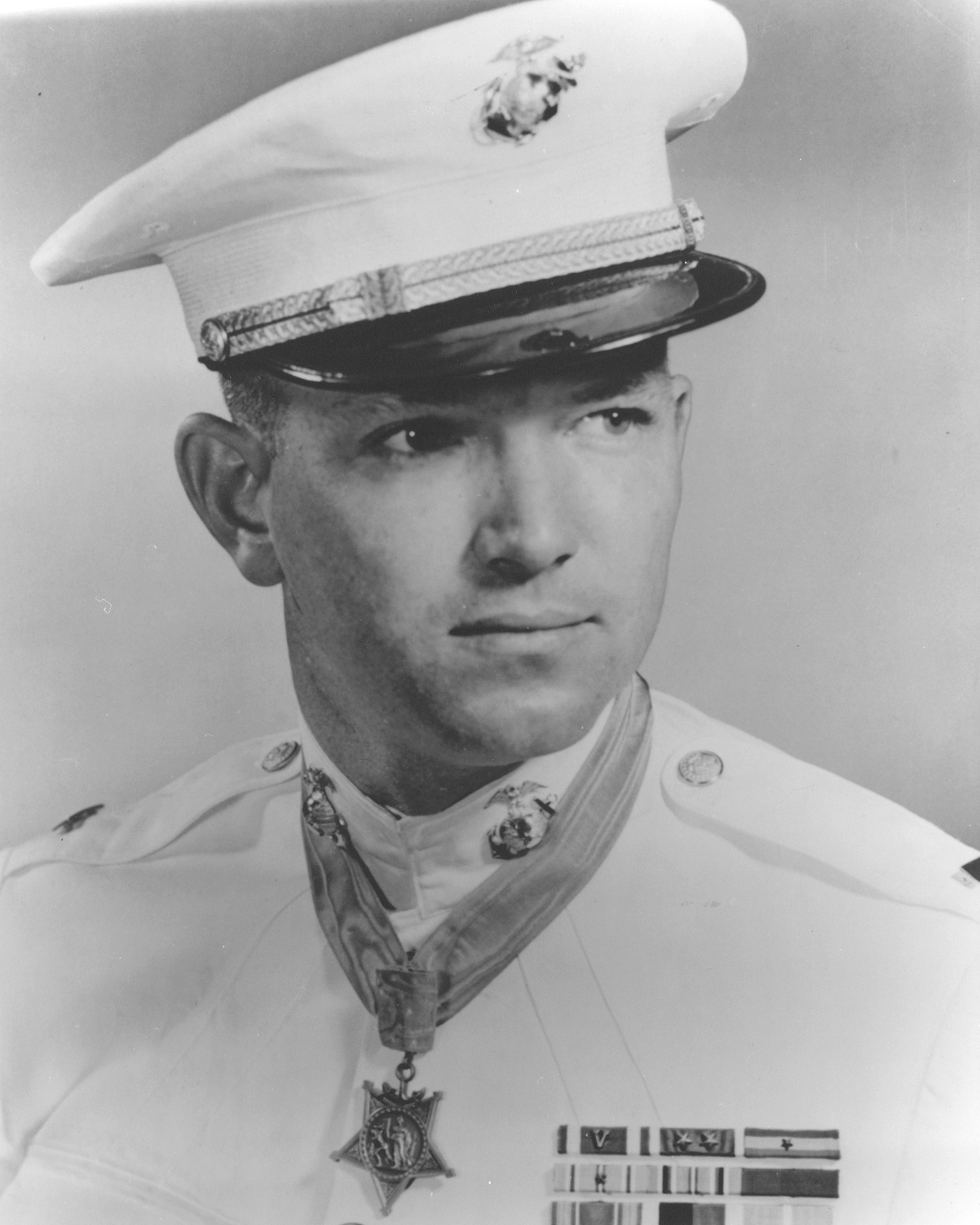
MAJOR
HENRY ALFRED COMMISKEY, SR., USMC (DECEASED)
Medal of Honor Citation
Major Henry Alfred Commiskey, Sr., the first Marine to be awarded the Medal of Honor for extraordinary heroism in the Korean conflict, died 15 August 1971, in Meridian, Mississippi.
As a first lieutenant, he was presented the Nation's highest decoration for valor by President Harry S. Truman in a White House ceremony on 1 August 1951. He was cited for fearlessly leading a charge up a hill and killing seven enemy soldiers in hand to hand combat.
The action occurred 20 September 1950 near Yongdungpo, Korea, on the outskirts of Seoul. Although Major Commiskey, then a first lieutenant, escaped harm then, he was wounded a week later, and again on 8 December 1950, after which he was returned to the U.S. for hospitalization.
He also had been wounded in action once before, during the Iwo Jima campaign of World War II, while serving as an enlisted man. There he received the Letter of Commendation for “exhibiting high qualities of leadership and courage in the face of a stubborn and fanatical enemy."
Born 10 January 1927, in Hattiesburg, Mississippi, Henry Alfred Commiskey attended Sacred Heart School there and worked as a brakeman on the Illinois Central Railroad before joining the Marine Corps, 12 January 1944, two days after his 17th birthday.
He served more than five years as an enlisted man, including 21 months overseas. Following recruit training at San Diego, California, he served at Camp Pendleton, California; Hawaii; and Japan in addition to the combat operations at Iwo Jima.
He also had been a drill instructor at the Marine Recruit Depot Parris Island, South Carolina. He was serving there, with the rank of staff sergeant, when he was accepted for officer training and commissioned a second lieutenant, 10 September 1949. He was promoted to first lieutenant in June 1951; to captain in July 1953; and to major in July 1959.
He completed training in June 1950, and taught in the tactics section at the Marine Corps Schools Quantico, Virginia, before going to Korea with the 1st Marines in August 1950.
The action for which 1stLt Commiskey received the Medal of Honor came a few days after the Inchon landing, in which he participated.
Following hospitalization at the Naval Hospital in Pensacola, 1stLt Commiskey served at the Naval Air Rocket Test Station, Lake Denmark, Dover, New Jersey. In September 1951, he became a Student Naval Aviator at the Naval Air Station, Pensacola. He received his wings at Corpus Christi in June 1953, and later completed jet training at El Toro, California.
In April 1954, he returned to Korea as a pilot with Marine Attack Squadron 212, Marine Aircraft Group 12, 1st Marine Aircraft Wing. He returned to the United States in September 1954, and at his own request was assigned line duty. He joined the 1st Marine Division in December 1954, and served consecutively as a company commander, Assistant S-3 of the 1st Service Regiment, and Division Reenlistment Officer. From September 1956 until July 1959, he served as Officer in Charge of the Marine Corps Recruiting Station, 6th Marine Corps Reserve and Recruitment District, Jackson, Mississippi.
Major Commiskey completed the Junior Course at the Marine Corps Schools, Quantico, Virginia, in June 1960, then served as an instructor, student company commander and Executive Officer, The Basic School, Quantico. Prior to his retirement from active duty in August 1966, he served as a recruiter.
In addition to the Medal of Honor, the Letter of Commendation with Ribbon and Metal Pendant, and the Purple Heart with two Gold Stars, Maj Cornmiskey held the following medals and decorations: the Presidential Unit Citation with two bronze stars indicative of three awards; the Good Conduct Medal; the Asiatic-Pacific Campaign Medal with one bronze star; the World War II Victory Medal; the Navy Occupation Service Medal with Asia clasp; the National Defense Service Medal with one bronze star; the Korean Service Medal with three bronze stars; the United Nations Service Medal; and the Korean Presidential Unit Citation.
Korean War 1950-1953 Medal of Honor